We
think we know Dermot Mulroney, after decades of watching him in classic
movies like My Best Friends Wedding, Young Guns, About Schmidt
and The Grey. However, despite the fact that he has been so visible
in films and on TV, did you know that Mulroney was a professional
musician?
Not just
an actor who put together a band, mind you, but a classically trained
cellist who works almost as regularly on music as he does on film. In
1995, Mulroney and a good friend, former Pogues founder James Fearnley,
even released an acclaimed rock album as part of the Low and Sweet
Orchestra.
Two
decades later, Mulroney and Fearnley have continued playing together
sporadically over the years, and the fruits of their labor are finally
coming out with their new band Cranky George, whose debut album Fat
Lot of Good was just released a few weeks ago.
Also in
the musical collective is Mulroney's younger brother (and fellow actor
and director) Kieran Mulroney (who has made many movies over the years,
but may be best remembered as the guy who yelled at George Costanza for
"double-dipping the chip" in a classic episode of Seinfeld). The
group is rounded out by acclaimed music producer Brad Wood (Liz Phair,
Smashing Pumpkins) and drummer Sebastian Sheehan Visconti.
Beyond
his musical release, Mulroney also plays a brilliant neurosurgeon in a
new TV series called Pure Genius which has just premiered.
On the
day of the Fat Lot of Good release party, we caught up with
Mulroney to talk about his musical labor of love and a lifetime of
juggling music and acting.
How
did you first get to know James Fearnley? How familiar were you with
his work with the Pogues?
I met
him before I really knew the Pogues' music. I met him through his at
the time soon-to-be wife, who is a wonderful actress and old friend,
Danielle von Zerneck. We were working together and her weird English
boyfriend was hanging about. We struck up and we've been mates ever
since. Neither of our memories, James and mine, is particularly
reliable, but we think it was about 1990.
H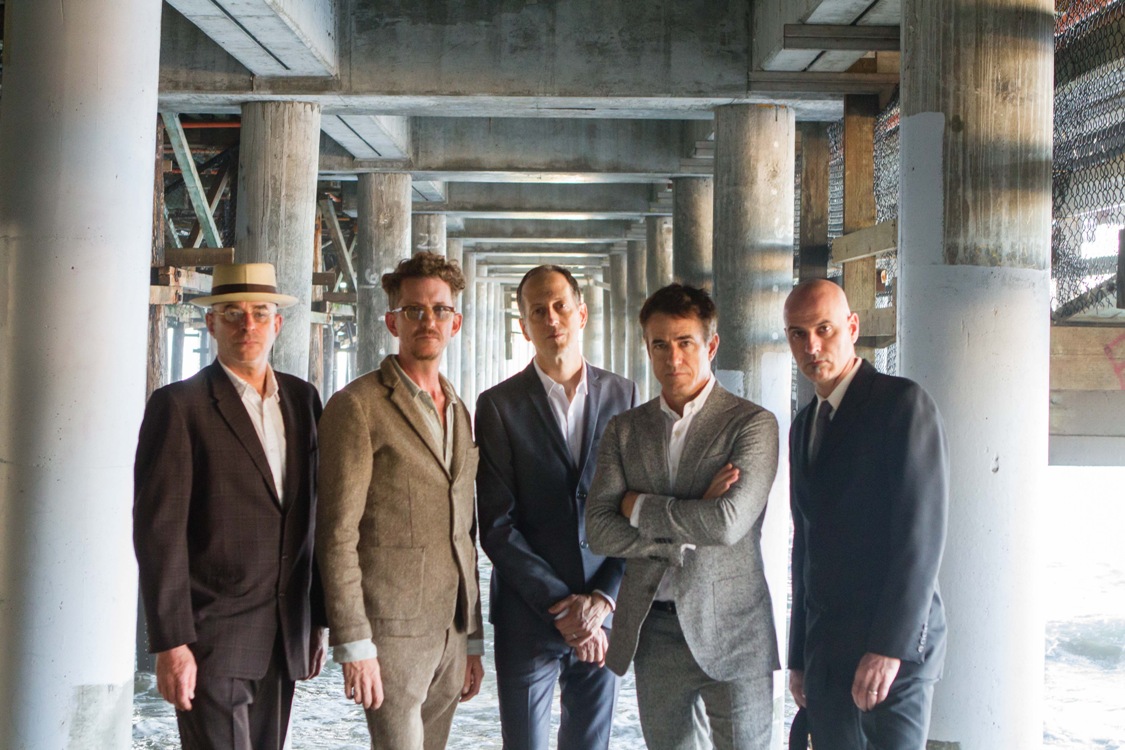 ow
did you decide to work together?
ow
did you decide to work together?
This is
how it went. As soon as I get that he's the Pogue, I clue into those
albums. They're still active at the time. Then he married Danielle and
moved in about four houses away, here in Los Angeles. So, we were
friends first, and then I was a fan, and now I'm a neighbor, and we
start playing together.
Okay,
interesting...
Previous
to all this, he had been in this bizarre Alex Cox movie Straight to
Hell. Remember that? They played those weird Englishly Mexican
outlaws. He was in the gang in the back, and he met Zander Schloss, who
also played one of the parts. He was one of those buddies of Alex Cox.
That connection became Low and Sweet Orchestra. This by now was '95 and
'96. We made an amazing album for Interscope. That was during
Interscope's heyday, really. When Death Row was peaking, and who came
out right with us? Wallflowers. No Doubt. Bush. Those albums were
all released right when Low and Sweet's was. We only did what we did.
We made a great album. People loved it. It didn't take off.
How
did that turn into Cranky George?
We kind
of morphed out. Then a couple, five, eight years later, me, Kieran and
James all have a handful of new songs that we've cooked up alone. We
threw them together and made it into Cranky George. So, part of what
you hear on Fat Lot of Good is what it sounds like. There are
three different singers. You don't really know who is who. There is a
group sing, all skate, kind of we all shout at the same time band. It
gives it that really rousing sound. It gets it a broader point of view
than maybe if you just had one singer. It's really organically part of
how the band came together.
What
is it about this group of guys that feels so comfortable as a musician?
One is
the gene pool. Kieran and I played in the same orchestras through high
school, so that doesn't really count. But by the time we were both in
Los Angeles and playing out, you really realize what kind of similar ear
you have. Instincts for songs, even for how to harmonize. Much of the
two-part... I'll say all of the two-part harmony on the album is him and
me. That sound is real true group sound. And I guess I lost track of
what your question is.
It
was what is it about this group of guys that feels so comfortable as a
musician?
Knowing
James for as long as I have, too, there's just a familiarity. His type
of playing, which whether you notice it or not, his accordion playing is
really unique. It sets his sound apart. You really only hear that in
the Pogues and in our band. Other guys who play accordion in rock bands
don't do it at all the same way. Same goes for Kieran, by the way. For
that matter, the way I play the mandolin in most of these songs also
isn't your typical approach to that instrument. We love that even
within interesting instrumentation, we're bringing a really unique sound
out of these instruments. We share that. We share a great drummer who
is getting rocking reviews for his interpretations of these songs,
Sebastian Visconti. And our bass player is the great producer Brad
Wood, who has worked with Liz Phair in his Chicago days, at the height
of that creative blossom out of Chicago in the 90s. He's got all that
experience and the best ear I've ever worked with.
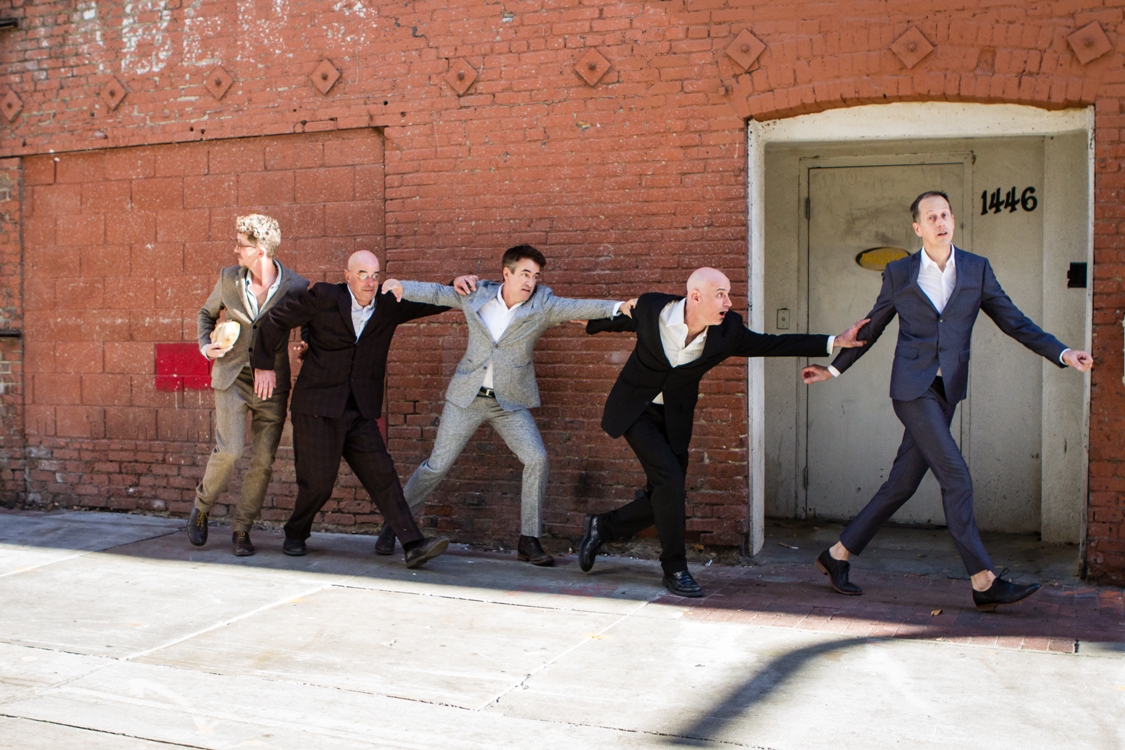 So
it all just gels?
So
it all just gels?
It's a
great combination of individual talents. But that's another thing I
love about the album, you have these different perspectives. Different
singers, but the songs vary quite a bit, too. They get together in a
way that feels real. That just perfectly describes it, answers the
question you're asking. How do these disparate things work? It really
is because it's a true connection between the players. The instruments
compliment one another. It's all part of the appeal of the band, I
think. It doesn't sound like individual... yeah, you'd be able to
describe that better as a writer, I'm sure. (laughs) Not like
your typical band where there is just four instruments, one guy sings,
some producer-y tracks. These are all really real songs.
Why
do you think the three lead singers and songwriters gives the band an
intriguing complexity and depth of styles and genres?
Yeah,
that's one of the things I love about it. I wouldn't know any
different. I'm trying to think of another band that actually does
that.
Right
there aren't that many any more.
There
really aren't that many. Some people liken us to Arcade Fire, and they
switch around a little bit, of course, and play multiple instruments.
We love that comparison, of course. As much as our sound developed even
before we knew about that group.
You
and your brother have been working together for years – both in film and
music. You always hear stories about great rock and roll brother feuds
– the Davies, the Gallaghers, The Everlys, The Fogertys and so many
more. How do you two keep things chill while working together?
(laughs hard) Yeah. I hate that you're
asking a very well-timed question. Because we got along last night, but
all five of us finally were like: it's late. It's midnight. We're
underfed and overtired and aging. And all five of us finally wound up
really super cranky. So we finally reached max cranky last night. I've
got to tell you, we got through it. Nobody threw anything. Nobody
really gave anyone the evil eye or the anger. We really managed it
well. Ten, twelve years later, we had our first band fight. Now, I'm
overstating it, but really it was at the end of our rehearsal and
everyone was really at the end of their rope, and we rolled with it, so
that's the best answer there.
I saw
an interview with the band – I’m sorry the website did not specify who
was talking – but it put as one of the biggest influences for the band
as Tom Waits. I picked up on that influence, particularly on songs like
“All the Rivers in the World,” and “Misery Road” and the title "Sausage
Moon."
Yeah.
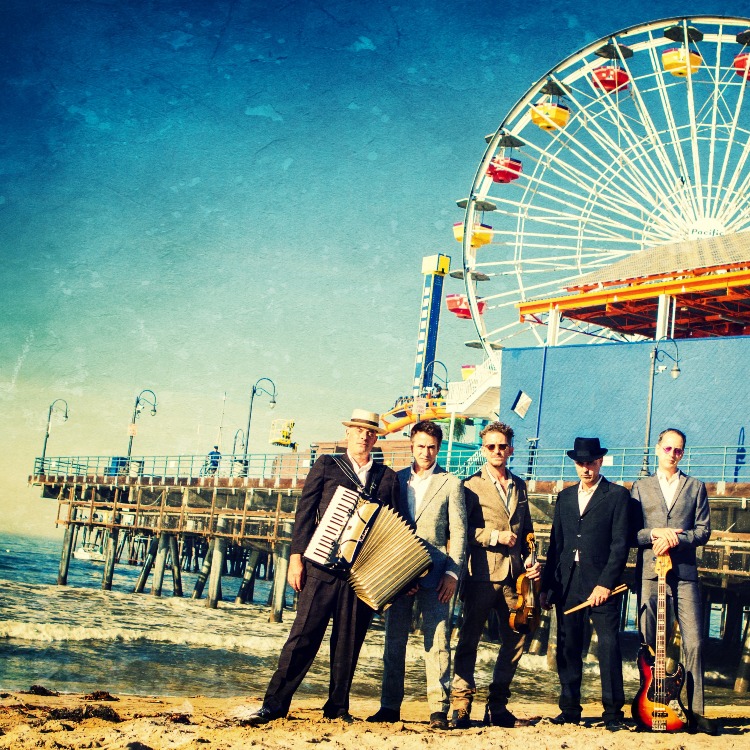 I
wrote a biography of Tom Waits, so of course I’m particularly interested
in that. How did Tom Waits inspire you as a musician and a songwriter?
I
wrote a biography of Tom Waits, so of course I’m particularly interested
in that. How did Tom Waits inspire you as a musician and a songwriter?
Oh,
fantastic. All of us have had our own love of him over the years.
James included, in particular. I wish I knew his guitar player's name,
but there is one little weird sort of Egyptian solo in the middle of
"The Bones" that I....
It
was probably Marc Ribot...
Yeah, I
more or less just ripped it off of "Raindogs" and put it in that song.
One with super-bizarre notes. That's the most direct influence in that
one little moment, but certainly the dark ballads and the driving,
guttural sound that our instruments, and Kieran and my voice have, very
much reflect that influence.
Songs
like “Tunnel of Love” and “Katyusha” have a strong gypsy influence. It
almost reminded me of Gogol Bordello. Why do you think the sound and
idea of gypsy carnies is so romantic to people?
I don't
know. We just may have had that as an influence. Much of it maybe
comes out of these instruments. Really, the accordion sound is a
signature sound. Also, more so originally than now, or I'd say not as
much on the recording as our live stage show, the three or four of us
are playing percussion with our feet while we're playing the other
instruments. The bass drum on the entire album – this should have been
touted, I think, somewhere – is not a bass drum. No one is playing the
kick drum anywhere on this album. He's playing a hat box. It's a hat
box with a foot pedal, so it's got this entirely unique [tone]. I mean,
it's played just like a kick drum, but the sound and the quality and the
thumping of it is because we're literally playing luggage. I play a
little tambourine hi-hat. Kieran plays cowbell on stage. So it's
always had that rickety, clanky carnival sound. Then when Kieran
brought in "Tunnel of Love" as a song, it really felt like a real one.
When we decided to lead the album with it, it became even more of a
signpost for what's to come in the album. It was almost a last-minute
decision to put that up front. I just think it's fantastic to lead with
that.
I
think so, too...
I think
it answers that question that people will ask us: what is the source of
this sound? Then, James always has mixed gypsy and sea shanty and
Middle Eastern strings and all that in his accordion playing. If you
listen to his accordion in the Pogues, even some of it is there,
certainly in their instrumentals. I can think of a couple of tunes
where that is already playing its part. So James' ear brought that.
Those became driving sounds, signature sounds with this group.
Then
again, the first single “Nighttime” and things like “Perfect Skin” have
more of a classic rock feel to it. Were you guys looking to explore
styles with the album?
Yeah. A
lot of it just happened because that's what came out of Kieran's warped
head. Because then we were doing a full-on rock song, I would say, with
"Perfect Skin." Even though it leads in in a unique way and so forth.
Then "Nighttime" came out as a fully realized piece the first time we
even played it. Even then, I knew that it was an epic, near-perfect,
big, rock-anthem song. It rises and it makes you wait and it is just so
fun to play. We're really proud of those two songs, those two you
mentioned, because they do spread our sides out a little bit. We tip
our hat to real rock and roll songs with those two for sure. That's
something we sought to do, thinking we could beef it up a little bit.
Even a song like "Waltz in Blue," in its original form, it stayed just
like the intro, just kind of tinkling along. Then one day we just
slammed in on the second verse and it even took on a rock and roll feel,
when it was really originally just a minimal ditty. Then when Brad Wood
threw this slightly heavier arrangement at us, that's when that song
really clicked. When it did accept that it was a rock song.
The
album has been five years in the making. How does it feel to finally
have it out there?
We're
thrilled. We also haven't played out on stage for a couple of years,
now. So we decided at one point to take whatever extra time we had to
finish the album, instead of rehearse and play out. It was kind of a
trade-off, we didn't collectively have enough time to do both. All of
this meeting up, we have about four shows this fall to help support the
album while we finish songs we love. But, really dude, the reason it
took that long wasn't ever indifference, it was really just the
logistics of getting... cobbling these tracks together. We played it
live, recorded that, and then of course you replace and advance. But
each of the songs I feel really still holds that group playing all at
once feel. Then of course, all of the songs, most of the songs, are
designed to have all five of us singing at once, so you get a great
sing-along feel, or an all-skate kind of songs where everybody has just
as much to sing as everybody else. We switch out lead singers. That's
kind of how we do...
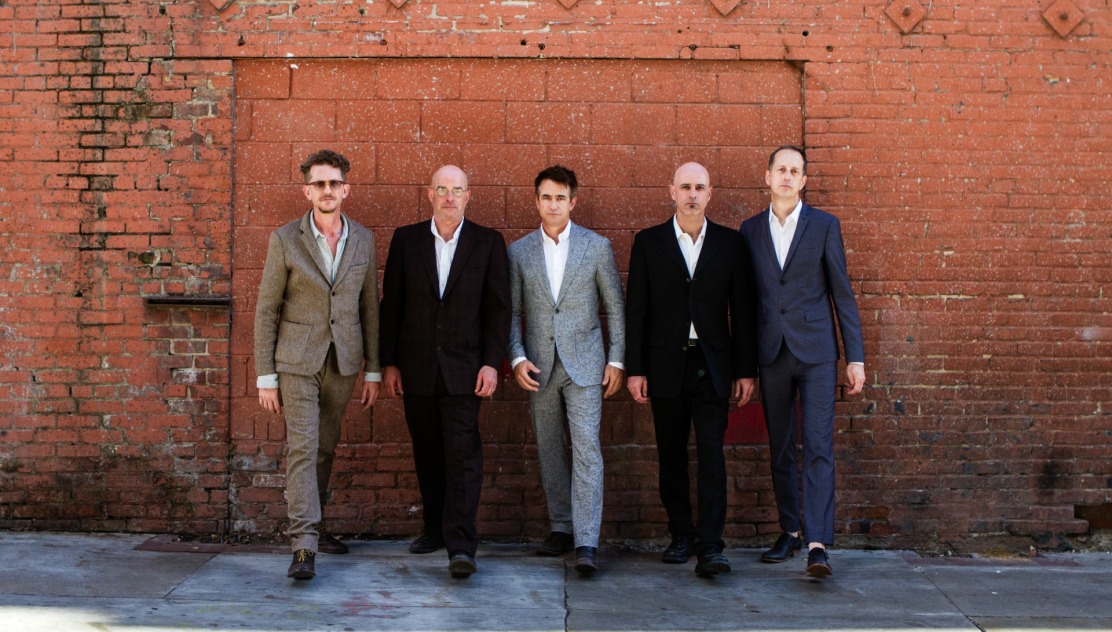 I
see you guys have a bunch of shows scheduled for the LA area. Any
chance of a national tour, or is that too hard to plan out with your
busy filming schedule?
I
see you guys have a bunch of shows scheduled for the LA area. Any
chance of a national tour, or is that too hard to plan out with your
busy filming schedule?
Yeah, we
don't know what the future brings. It will obviously depend on what
kind of... or any... popularity. (laughs) Any people's desire.
Then scheduling would always be a difficult issue. So, we'll take what
we can get. We'd love to. I've heard that's a great way to make
money. (laughs) Selling CDs isn't anymore. So we've got to
just wait and see what happens. And like I said, yes, that would be the
answer to that. We will definitely get out there however we can.
The
music business has changed so much over the years – with streaming and
piracy and so many factors. Do you think it’s harder for a new group to
get attention in the current crowded marketplace?
I do.
There's just no marketing other than what people generate for
themselves. Obviously, social media has become what was once the label
PR machine. It is strange. You get this notion that this great wild
success can just pop off of YouTube, but we'll find out. I don't know
how that's going to work. We have no support. We're doing this
literally as a ma and pop operation off of Kieran's dining room table.
Sending our own... they're mailing the albums out individually to people
that have preordered them. (laughs) There's nobody driving the
bus except us, so it is going to be catch as catch can. I think it's
going to be fascinating to see what goes down, man.
People have known you for years as an actor, but you have also always
been a musician. Is it at all hard to get people to look at you in a
different way?
You
know, to be honest with you, I never really try to steer people's
perception of me. Most of the publicity has always been attached to a
project or something. I've never brought forward so much that I'm a
musician the way – and let's be honest – I've seen other actors do it,
or tried to hitch their band's fortune on their movie stardom and so
forth. None of that ever really happened with me. This is really real
and organic. I'm a classically-trained cellist, who brought those
influences to playing music with my friends. They turned out to be
amazing songs that we had to be righteous and record and put out. It's
a little different path than the cliché of the actor who has a side
band. Really, my real side gig, my second job, is playing cello in
scoring orchestras for blockbuster movies. For that, I'm actually an
union musician and get paid for it. Cranky George is still – as
important as it seems to us – it's just an avocational pursuit at the
moment. But, who knows what tomorrow brings? (chuckles) Who
knows?
Are
there any ways that you feel like your acting experience has informed
your musical career – for example, being more comfortable on stage – or
do you consider them totally different parts of your life?
Maybe.
They're really different feelings when you're doing it. Different ways
of preparing and so forth. I'll tell you what, tomorrow night we're
playing, and there's a couple of songs I really haven't played live for
about four years, so I will be using my acting ability to make it look
like I'm not f-ing up the chords. (laughs)
Just
on a more basic tack, is it difficult fitting your music in when you
work so regularly in acting?
Well,
right now I'm on a great show called Pure Genius that opens like
two weeks from now. It's a steady gig. It's in town. I have a little
more say in my life and my logistics. The couple of years leading up –
last four years or so – I was all over the place chasing film jobs and
so forth. So there's a chance I'll have a little more balance in life
now that I'm working at home. I won't have travel around the calendar
the way I have in the several years preceding now.
I
hope you don’t mind me asking a couple of quick questions about some
acting projects you have coming up as well while I have you.
No, I'd
love if you'd include it and time it together somehow.
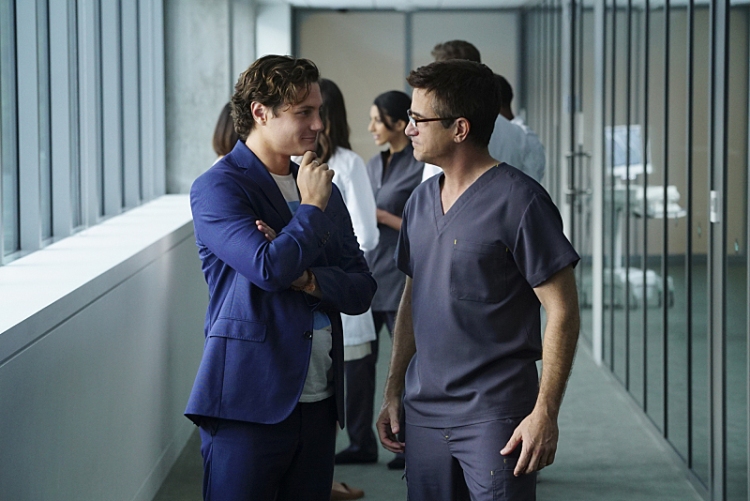 Your
new series Pure Genius
has just debuted. What can people expect from the show?
Your
new series Pure Genius
has just debuted. What can people expect from the show?
It's
really turning out to be a great show, and I know, because I've been
doing this long enough to be able to get a feel for how the thing is
going to be when it's done. You can never be 100% accurate, but my
sense is that we've got great material. [Showrunner] Jason Katims [who
previously did Friday Night Lights and Parenthood, amongst
others] is tried and true, one of the most successful television
producers of all time, really. [He's] writing it and hands-on producing
it. Great cast. Augustus Prew is fantastic. He's playing sort of a
Steve Jobs-type of tech billionaire who opens the state-of-the-art
hospital. With interesting diseases and medical problems, you come and
we'll take care of you. He recruits, hires the best surgeons in the
country. That includes my character. And we're off to the races,
making a tech show in a medical drama environment.
That
sounds fascinating...
It
really is. The cool part is that we're putting in stories amazing new
medical procedures, stuff we've never heard of yet. We're ahead of the
hospital rooms. The producer likes to say we're making the show five
minutes in the future, because this stuff is real, and it's coming.
Whether it's virtual reality, or robotic with sensations... Would it be
also ingestible sensors? Bio-sensors? All the stuff that's just about
to hit hospitals and be practical; we're telling that story now. It's
really fun to be ahead of the times.
You
also have a big action film called Sleepless
coming next year with Jamie Foxx. What is that experience like?
Jamie
Foxx takes the lead and takes a fantastic action hero trapped in a
casino – basically a Die Hard chase movie in a casino. I play
the dirty casino manager who is running a cocaine game out of his
executive suite. Really fun part, and really the best thing there was
to work with someone with the kind of talent that Jamie Foxx has. It's
something else when you work with him. You realize that he has
everything. I've always had the most respect for actors who can do
everything: comedy, drama, sing, dance, intrigue, thriller, action.
Jamie... there are so few American actors, or any actors, that can do
all the variety of things that Jamie Foxx can do. We got to be
friends. He's an awesome guy. I haven't seen Sleepless yet, but
I really think it's going to be a real satisfying action thriller.
You’ve been working more on TV after doing mostly movies years. How is
working on a series different? Do you enjoy, like you said earlier,
being able to stay put for a while?
Well,
that's a plus. The music business and the film business, both have
changed so drastically. In both categories of my life, I'm approaching
from a different angle now. I had to adapt to the industry changes.
Film work dried up, really – the films that I was doing, independent
films. They're really just not making as much. And if so, it's some
sort of bargain to do it. It was happening at the same time that
television is obviously peaking in terms of quality and prominence. So
one sort of became the other, in a way. I'm just happy I was light on
my feet, and facile, and could make the adjustment, so that I could
continue doing what I've always done. Which is pursue great parts with
the top directors and producers and working with great actors. The same
template applies to me doing television.